
Sir George Houston Reid was an Australian politician, diplomat and barrister who served as the fourth prime minister of Australia, from 1904 to 1905, holding office as the leader of the Free Trade Party. He previously served as the 12th Premier of New South Wales from 1894 to 1899, and later the High Commissioner to the United Kingdom of Australia from 1910 to 1916.
The Protectionist Party, also known as the Protectionist Liberal Party or Liberal Protectionist Party, was an Australian political party, formally organised from 1887 until 1909, with policies centred on protectionism. The party advocated protective tariffs, arguing it would allow Australian industry to grow and provide employment. It had its greatest strength in Victoria and in the rural areas of New South Wales. Its most prominent leaders were Sir Edmund Barton and Alfred Deakin, who were the first and second prime ministers of Australia.

The 1988 Canadian federal election was held on November 21, 1988, to elect members to the House of Commons of Canada of the 34th Parliament of Canada. It was an election largely fought on a single issue: the Canada–United States Free Trade Agreement (CUSFTA); the Progressive Conservative Party campaigned in favour of it whereas the Liberal Party and the New Democratic Party (NDP) campaigned against it.

The 1918 United Kingdom general election was called immediately after the Armistice with Germany which ended the First World War, and was held on Saturday, 14 December 1918. The governing coalition, under Prime Minister David Lloyd George, sent letters of endorsement to candidates who supported the coalition government. These were nicknamed "Coalition Coupons", and led to the election being known as the "coupon election". The result was a massive landslide in favour of the coalition, comprising primarily of the Conservatives and Coalition Liberals, with massive losses for Liberals who were not endorsed. Nearly all the Liberal MPs without coupons were defeated, including party leader H. H. Asquith.
The Liberal Party was a parliamentary party in Australian federal politics between 1909 and 1917. The party was founded under Alfred Deakin's leadership as a merger of the Protectionist Party and Anti-Socialist Party, an event known as the Fusion.
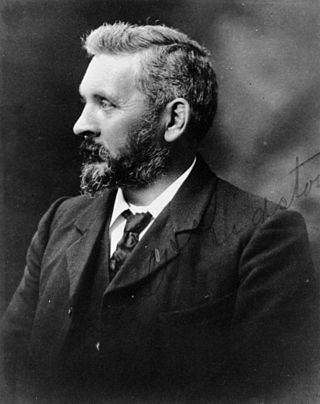
William Kidston was an Australian bookseller, politician and Premier of Queensland, from January 1906 to November 1907 and again from February 1908 to February 1911.
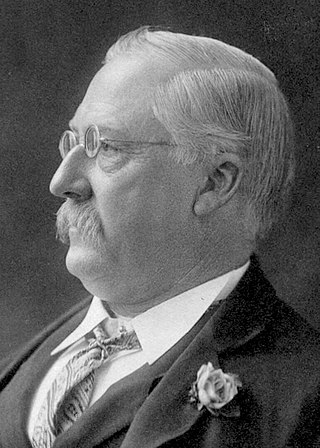
Sir George Turner was an Australian politician. He served two terms as Premier of Victoria, holding office from 1894 to 1899 and 1900 to 1901 as a liberal. After Federation he was invited by Edmund Barton to join the inaugural federal ministry, becoming the first Treasurer of Australia. He held office until 1904 under Barton and Alfred Deakin, then a few months later resumed office under George Reid. The government fell in 1905 and Turner retired from politics at the 1906 election.
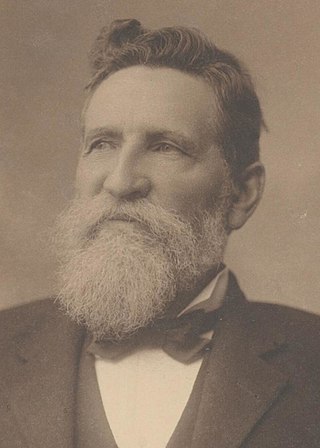
Allan McLean was an Australian politician who served as the 19th Premier of Victoria, in office from 1899 to 1900. He was later elected to federal parliament, where he served as a government minister under George Reid.
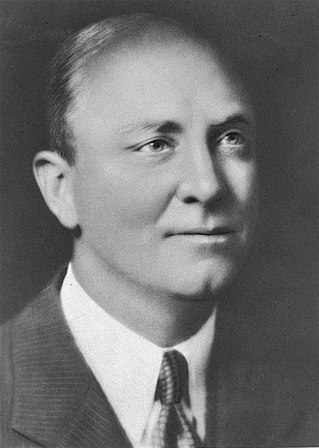
Alexander Mair was an Australian politician who served as Premier of New South Wales from 5 August 1939 to 16 May 1941. Born in Melbourne, Mair worked in various businesses there before moving to Albury, New South Wales where he went on to be a member of the New South Wales Legislative Assembly for fourteen years. In 1932, Mair was elected to the seat of Albury and was re-elected a further four times. He rose quickly through the cabinet of Bertram Stevens' United Australia Party government, becoming an Assistant Minister in April 1938, Minister for Labour and Industry in June and Colonial Treasurer in October.
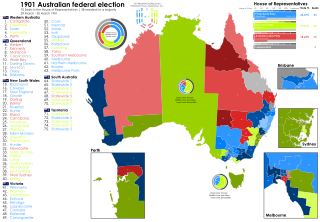
The 1901 Australian federal election for the inaugural Parliament of Australia was held in Australia on Friday 29 March and Saturday 30 March 1901. The elections followed Federation and the establishment of the Commonwealth of Australia on 1 January 1901. All 75 seats in the Australian House of Representatives, six of which were uncontested, as well as all 36 seats in the Australian Senate, were up for election.

Henry Gregory was an Australian politician. He was a Ministerialist member of the Western Australian Legislative Assembly from 1897 to 1911, representing the electorates of North Coolgardie (1897-1901) and Menzies (1901-1911). He was state Minister for Mines from 1901 to 1904 under George Leake and Walter James and Minister for Mines and Railways from 1905 to 1911 under Hector Rason, Newton Moore and Frank Wilson. He rose to become Treasurer from 1910 to 1911, a role that also entailed him acting as Premier if Wilson was absent, but lost his seat at the 1911 state election.
This article provides information on candidates who stood for the 1906 Australian federal election. The election was held on 12 December 1906.

John Daniel FitzGerald was a politician, union official, journalist and barrister in New South Wales, Australia.
Ministerialists and Oppositionists (Western Australia) were political groupings that were in force in the Western Australian parliament between 1890 and 1911.

The 1907 Victorian state election was held in the Australian state of Victoria on Friday, 15 March 1907 to elect 45 of the 65 members of the state's Legislative Assembly. The other 20 seats were uncontested.

The 1902 Victorian State election was held in the Australian state of Victoria on 1 October 1902, to elect 70 of the 95 members of the Victorian Legislative Assembly. The other 25 seats were uncontested.
The Tasmanian Labor Party, officially known as the Australian Labor Party (Tasmanian Branch) and commonly referred to simply as Tasmanian Labor, is the Tasmanian branch of the Australian Labor Party. It has been one of the most successful state Labor parties in Australia in terms of electoral success.

The Victorian Liberal Party, officially known as the Liberal Party of Australia (Victorian Division) and branded as Liberal Victoria, is the state division of the Liberal Party of Australia in Victoria. It was formed in 1944. It became the Liberal and Country Party (LCP) in 1949, and simplified its name to the Liberal Party in 1965.

The 1900 Victorian colonial election was held on 1 November 1900 to elect the 18th Parliament of Victoria. All 95 seats in the Legislative Assembly were up for election.
The Liberal Party, often known simply as the Liberals, was the name used by a number of political groupings and parties in the Victorian Parliament from the late 19th century until around 1917.














